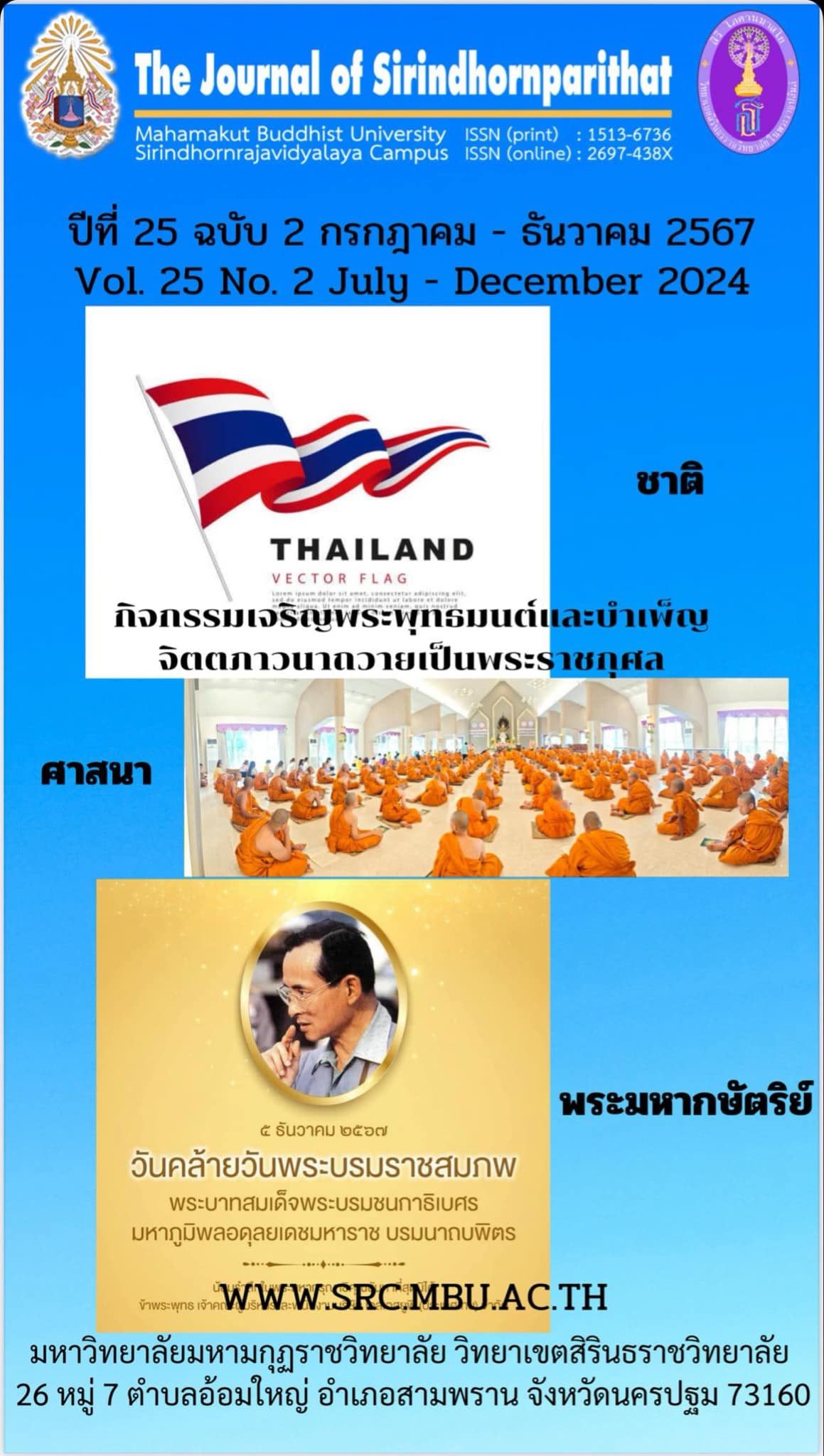Factors Effect to be a High Performance School of High Schools under The Secondary Education Service Area Office Bangkok 1
-
Keywords:
High Performance Organization, HPO, High Performance SchoolAbstract
The objective research determines the factors affecting the high efficiency schools under the Secondary Education Service Area Office Bangkok area 1 following the High Performance Organizations (HPO) framework. The literature survey reveals five important factors as follows: Strategic Analysis and Planning, Innovation, Leadership, Learning and Development, and Motivation and Reward. Therefore, the researcher studies all factors and determines their effect on the school development into HPO by continuous and sustainable development. The sample group consists of administrators and teachers being 307 persons of 23 secondary schools from 67 total schools. Creates a 5-level scale questionnaire (50 items) as a tool revised by 3 experts (IOC +.67) and tryout by 30 samples giving Cronbach’s Alpha .97. Then, survey the opinions of the sample group, the results represent using statistics, frequency, percentage, mean, standard deviation, Pearson’s correlation coefficients (.71-.89, p < .01) and Multiple Regression Analysis (.05 sig.). In conclusion, three major factors are Motivation and Reward (.93x5), Learning and Development (.72 x4), and Analysis and Strategic Planning (.70x1) and two miner factors are, Leadership (.43 x3) and Innovation (.32x2). Their relation summarizes as follows: Y= 7.02+0.93x5+0.72x4+0.70x1+0.43x3+0.32x2.
References
เสกสรรค์ ปิวศิลป์ศักดิ์. (2562). รูปแบบการบริหารสถานศึกษาสู่ความเป็นเลิศโดยใช้กระบวนการจัดการเรียนรู้ของสถานศึกษาขั้นพื้นฐาน สังกัดสำนักงานเขตพื้นที่การศึกษามัธยมศึกษา เขต 35. วิทยานิพนธ์ดุษฎีบัณฑิต บัณฑิตวิทยาลัย มหาวิทยาลัยราชภัฏเชียงราย.
ดุษณีย์ ยศทอง. (2561). แนวทางการพัฒนาคุณภาพการบริหารจัดการสู่องค์กรพยาบาลสมรรถนะสูง: กรณีศึกษา โรงพยาบาลศิริราช. วิทยานิพนธ์ดุษฎีบัณฑิต บัณฑิตวิทยาลัย มหาวิทยาลัยสยาม.
ธันวา วาทิตต์พันธ์. (2022). องค์ประกอบของโรงเรียนมัธยมศึกษาสมรรถนะสูง. Yanasangvorn Research Institute Vol.13 No.1, 47-58.
นันทวรรณ บุญช่วย. (2559). ปัจจัยเชิงสาเหตุการเป็นองค์กรสมรรถนะสูงสำหรับมหาวิทยาลัยของรัฐ ในเขตกรุงเทพมหานคร. วิทยานิพนธ์ดุษฎีบัณฑิต บัณฑิตวิทยาลัย มหาวิทยาลัยรามคำแหง.
ประสิทธิ์ วัฒนาภา. (2559). มหาวิทยาลัยมหิดล คณะแพทยศาสตร์โรงพยาบาลศิริราช. กรุงเทพมหานคร.
ปุญชรัศมิ์ เหมบุรุษ และ วีระวัฒน์ อุทัยน์. (2562). รูปแบบภาวะผู้นำการเปลี่ยนแปลงของผู้อำนวยการโรงเรียนมัธยมศึกษาขนาดใหญ่พิเศษที่ส่งเสริมการเป็นองค์กรสมรรถนะสูง. วิทยานิพนธ์ดุษฎีบัณฑิต บัณฑิตวิทยาลัย มหาวิทยาลัยอีสเทิร์นเอเชีย.
พสุ เดชะรินทร์. (2550). องค์กรแห่งการเรียนรู้ วัฒนธรรมองค์การ. ผู้จัดการายสัปดาห์.
วิโจรน์ สารรัตนะ. (2555). แนวคิด ทฤษฎี และประเด็นเพื่อการบริหารการศึกษา. กรุงเทพมหานคร: หจก. ทิพยวิสุทธิ์.
สพม กทม.1. (2563). แผนพัฒนาการศึกษาขั้นพื้นฐาน สำนักงานเขตพื้นที่การศึกษามัธยมศึกษา เขต 1 (พ.ศ. 2563-2565). กรุงเทพมหานคร: สำนักงานเขตพื้นที่การศึกษามัธยมศึกษา เขต 1.
สรรเพชญ โทวิชา. (2560). การพัฒนากลยุทธ์การบริหารสถานศึกษาสมรรถนะสูง สังกัดสำนักงานเขตพื้นที่การศึกษามัธยมศึกษา. วิทยานิพนธ์ดุษฎีบัณฑิต บัณฑิตวิทยาลัย มหาวิทยาลัยราชภัฏวไลยอลงกรณ์.
สุจิตรา ยางนอก. (2562, 10 10). [ออนไลน์] สืบค้นเมื่อ 10 มีนาคม 2565 จาก http://blog.bru.ac.th/members/sujitra2520/document/
Holbeche, L. (2012), The High Performance Organization, London: Routledge
Julie Linthorst, A. d. (2020). Megatrends and Disruptors and Their Postulated Impact on Organizations. MDPI Journal, 1-25.
Kirchmer, M. (2017). High Performance Through Business Process Management, Strategy Execution in a Digital World. Cham, Switzerland: Spinger.
Likert, R. (1967). Atitude Theory and Measurement. In The Method of Constructing and Attitude Scale. In Reading on Fishbeic, M.(Ed) (pp. 90-95). New York: Wiley & Son.
Lynch, R. (2015). What is strategic management? In R. Lynch, Strategic Management (pp. 8-27). United Kingdom: Pearson.
Schreus, M., & Meingast, A. (2015). A High Performance Organization. HPO Center.
Thanasarn Rujira, et al. (2020). Synthesis of Vocational Education College Transformation Process toward High-Performance Digital Organization. International Journal of Information and Education Technology, 832-837.
Thanh Tung Do and Ngoc Khuong Mai. (2020). High-performance organization: a literature review. Emerald Insight, 297-309.
Waal & Wang. (2017). Applicability of the High Performance Organization (HPO) Framework in the Chinese: The Case of a State-Owned Enterprise. Journal of Chinese Human Resource Management, 1-29.
Waal, A. d. (2020). High Performance Managerial Leadership. California: ABC-CLIO, LLC.
Downloads
Published
Issue
Section
License
Copyright (c) 2024 Mahamakut Buddhist University

This work is licensed under a Creative Commons Attribution-NonCommercial-NoDerivatives 4.0 International License.
บทความที่ได้รับการตีพิมพ์เป็นลิขสิทธิ์ของ มหาวิทยาลัยมหามกุฏราชวิทยาลัย วิทยาเขตสิรินธรราชวิทยาลัย
ข้อความที่ปรากฏในบทความแต่ละเรื่องในวารสารวิชาการเล่มนี้เป็นความคิดเห็นส่วนตัวของผู้เขียนแต่ละท่านไม่เกี่ยวข้องกับหาวิทยาลัยมหามกุฏราชวิทยาลัย วิทยาเขตสิรินธรราชวิทยาลัย และคณาจารย์ท่านอื่นๆในมหาวิทยาลัยฯ แต่อย่างใด ความรับผิดชอบองค์ประกอบทั้งหมดของบทความแต่ละเรื่องเป็นของผู้เขียนแต่ละท่าน หากมีความผิดพลาดใดๆ ผู้เขียนแต่ละท่านจะรับผิดชอบบทความของตนเองแต่ผู้เดียว



